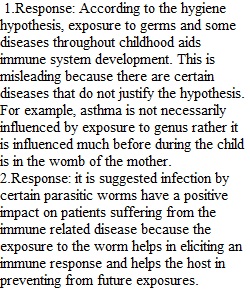


Q Questions from Readings 1. You may have seen or heard the term “Hygiene Hypothesis” in the media or in past readings. Why might this term be misleading? 2. Why is it suggested that infection by certain parasitic worms may have a positive impact on patients suffering from immune-related diseases? 3. What is meant by the term, “evolutionary mismatch?”Data Analysis For this lab, you will need to submit your graphs for the IL-10 and T-reg data. You can submit these separately as Excel files in Canvas or you can copy and paste the graphs themselves here: Experimental Questions 1. What were the independent and dependent variables in the experiment? 2. What were the hypotheses and experimental predictions? In your predictions, remember to describe what you expected to happen (based on your hypothesis) to IL-10 levels, T-reg cell numbers, and numbers of exacerbations for your treated vs. untreated patient groups.
View Related Questions